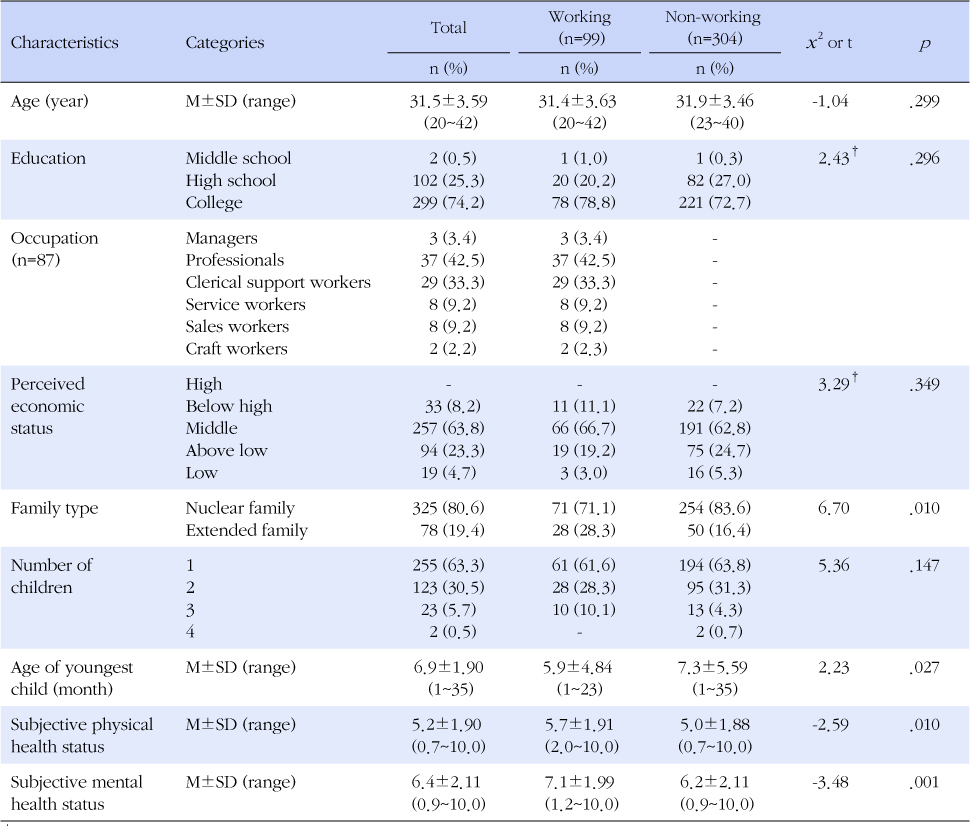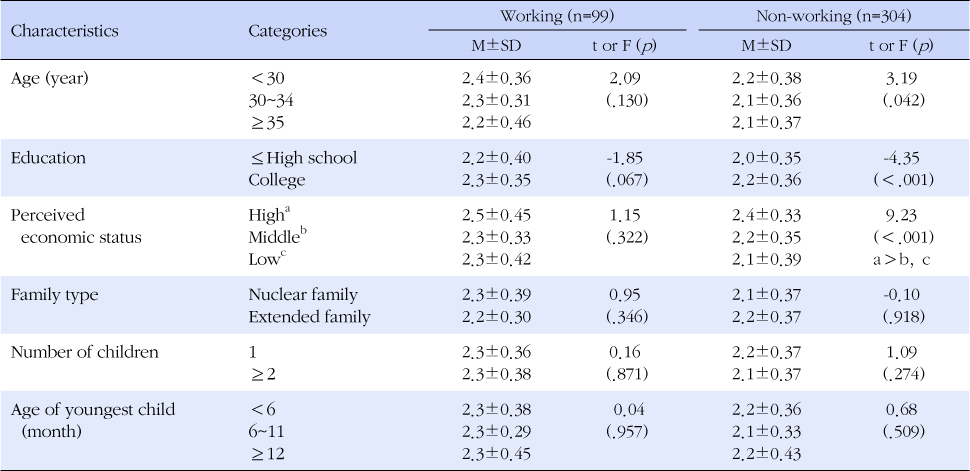Articles
- Page Path
- HOME > J Korean Acad Community Health Nurs > Volume 25(4); 2014 > Article
-
Original Article
- Comparative Study on Health Promoting Behavior in Working and Non-working Mothers with Infants and Toddlers
- Hee Chong Baek
-
Journal of Korean Academy of Community Health Nursing 2014;25(4):282-290.
DOI: https://doi.org/10.12799/jkachn.2014.25.4.282
Published online: December 31, 2014
Red Cross College of Nursing, Chung-Ang University, Seoul, Korea.
• Received: September 16, 2014 • Revised: December 17, 2014 • Accepted: December 22, 2014
© 2014 Korean Academy of Community Health Nursing
This is an Open Access article distributed under the terms of the Creative Commons Attribution Non-Commercial License (http://creativecommons.org/licenses/by-nc/3.0/) which permits unrestricted non-commercial use, distribution, and reproduction in any medium, provided the original work is properly cited.
- 942 Views
- 4 Download
- 4 Crossref
Abstract
-
Purpose
- The purpose of this study was to compare health promoting behavior between working and non-working mothers with infants and toddlers, and to investigate factors affecting the mothers'health promoting behavior.
-
Methods
- This descriptive study was conducted through conveniently sampled 403 women who visited the child health clinics at two public health centers. The questionnaire included the Health Promoting Life Style Profile (HPLP) and a visual analogue scale for subjective health status. ANCOVA, one-way ANOVA, correlation analysis, and stepwise multiple regression were conducted using SPSS ver. 21.
-
Results
- Working mothers' average HPLP score (2.30±0.37) was higher than non-working mother's (2.15±0.37). The score of the physical activity subscale was lowest among the subscales and there was a difference between the two groups. Subjective mental health status was the only predictor of working mothers'health promoting behavior, and it explained 23.2% of variance in health promoting behavior. Subjective mental health status, education, and age were the predictors of non-working mothers' health promoting behavior and they explained 27.2% of variance in health promoting behavior.
-
Conclusion
- According to the findings, both working and non-working mothers' health promoting behaviors were low. To promote mothers' health, it is necessary to develop diverse community health promotion programs to support mothers.
- 1. Lee SY, Im JY. Improving the population quality in low fertility and aging Korea: Policy challenges for birth outcomes for women of advanced maternal age [Internet] Seoul: Korea Institute for Health and Social Affairs; 2013;cited 2014 March 8. Available from: http://img.kisti.re.kr/originalView/originalView.jsp
- 2. Jeon BJ. Low fertility era and maternal health promotion. J Korea Contents Assoc. 2014;14(6):162–173. http://dx.doi.org/10.5392/JKCA.2014.14.06.162Article
- 3. Ahn MO. Life-cycle specific comprehensive women's health and maternal child health. J Korean Soc Matern Child Health. 2014;18(1):1–12. Article
- 4. Yang EH, Choi HS. A study on the relationships between psychological well-being and parenting self-efficacy of preschooler mothers. J Korea Open Assoc Early Child Educ. 2011;16(6):211–230.
- 5. Kim MS, Min SI. Mediation effect of mother's lifestyle habit between mother's stress and young children's lifestyle habit. Korea J Child Care Educ. 2012;72:263–279.
- 6. Joo AR. A study on the relationship between family stress and health promoting behavior of the dual earner couples. Korean J Occup Health Nurs. 2011;20(2):221–229. http://dx.doi.org/10.5807/kjohn.2011.20.2.221Article
- 7. Kim EK, Park YS. Health promotion, stress and quality of life in patients with genital neoplasms. Korean J Rehabil Nurs. 2010;13(2):114–122.
- 8. Son SM. Parenting Stress and related factors of employed and non-employed mothers with infants. J Future Early Child Educ. 2012;19(1):331–357.
- 9. Song YJ, Lee MR, Chun HU. Parenting stress changes in both of continuous working and non-working mothers after the birth of their first child: A focus on the effects of the values, knowledge and expectations about their children. Korean J Child Stud. 2014;35(5):15–35. http://dx.doi.org/10.5723/KJCS.2014.35.5.15Article
- 10. Walker SN, Sechrist KR, Pender NJ. The health promoting lifestyle profile: Development and psychometric characteristics. Nurs Res. 1987;36(2):76–81.
- 11. Chung KA. A study on the relationship between health perception, prenatal care behaviors and health promoting behaviors in unmarried pregnant women. Korean J Women Health Nurs. 2006;12(2):115–123. ArticlePDF
- 12. Jo L. A study on factors influencing the health promoting behaviors in postpartum women [master's thesis]. [Gwangju]: Chonnam National University; 1998. 59 p.
- 13. Kim HJ. A study on the relationship among occupational stress, parenting stress, depression and health promoting behavior in office-working mothers [master's thesis]. [Seoul]: Seoul National University; 2011. 66 p.
- 14. Lee YM, Kim GM, Jung YH. Factors affecting a health promoting lifestyle in middle-aged women. J Korea Contents Assoc. 2014;14(10):570–582. http://dx.doi.org/10.5392/JKCA.2014.14.10.570Article
- 15. Park BY. Factors influencing the health promotion behavior among middle-aged women [master's thesis]. [Seoul]: Ewha Women's University; 2008. – p. .
- 16. Lee JH. The relationship of depression, self-esteem and health promoting behaviors in the elderly women who live alone. J Korean Acad Psychiatr Ment Health Nurs. 2005;14(2):109–118.
- 17. Shin KR, Kim JS, Kim JY. A comparison on self-rated health, health status, and health promotion behaviors between low income and non-low income elderly women. Korean J Adult Nurs. 2005;17(5):732–742.
- 18. Seo IJ, Park JS. Health promoting behaviors, health problems and self-rated health status in female marriage immigrant in Korea. J Digit Convergence. 2013;11(4):369–382.
- 19. Choi JY. The health-promoting behavior and the related factors among Japanese marriage-migrant women [master's thesis]. [Daegue]: Kyungbook National University; 2011. 75 p.
- 20. Black C, Ford-Gilboe M. Adolescent mothers: Resilience, family health work and health-promoting practices (Issues and Innovations in Nursing Practice). J Adv Nurs. 2004;48(4):351–360. Article
- 21. Monteith B. The relationships among mother's resilience, family health work, and mother's health-promoting lifestyle practices in family with pre-school children [master's thesis]. [Ontario]: University of Western Ontario; 1997. 105 p.
- 22. Chen CM, Kuo SF, Chou YH, Chen HC. Postpartum Taiwanese women: Their postpartum depression, social support and health-promoting lifestyle profiles. J Clin Nurs. 2007;16(8):1550–1560. Article
- 23. Ko SH, Chen CH. Comparison of health-promoting lifestyles between postnatal Han Taiwanese and Indigenous women. J Nurs Res. 2010;18(3):191–198. http://dx.doi.org/10.1097/JNR.0b013e3181edef18Article
- 24. Faul F, Erdfelder E, Lang AG, Buchner A. G*Power 3: A flexible statistical power analysis program for the social, behavioral, and biomedical sciences. Behav Res Methods. 2007;39(2):175–191. ArticlePDF
- 25. Baek HC, Lee SJ, Go YA, Yang SH. Factors affecting health promoting lifestyle in nursing students. J Korean Acad Public Health Nurs. 2011;25(1):73–83.
- 26. Kim MS, Min SI. Mediation effect of mother's lifestyle habit between mother's stress and young children's lifestyle habit. Korea J Child Care Educ. 2012;72:263–279.
- 27. Paluska SA, Schwenk TL. Physical activity and mental health: Current concepts. Sports Med. 2000;29(3):167–180.
- 28. Park JS, Lee HR. A comparative study on a health promoting lifestyle and perceived health status between high and low income elderly. J Korean Community Nurs. 2003;14(1):157–166.
- 29. Ohum MS, Chun DI. A study on caregiving burdens and social support about the low-income families of single parents. Soc Welf Rev. 2006;11:75–108.
Figure & Data
References
Citations
Citations to this article as recorded by 

- The Effects of the Infant Health Promotion Program for Mothers with Their Firstborn Infants
Chae-Min Yoon, Mi-Ae You
Journal of Korean Academy of Nursing.2023; 53(6): 666. CrossRef - Mediating and Moderating Effects of Family Cohesion between Positive Psychological Capital and Health Behavior among Early Childhood Parents in Dual Working Families: A Focus on the COVID-19 Pandemic
In Young Cho, Sun-Hee Moon, Ji Yeong Yun
International Journal of Environmental Research and Public Health.2021; 18(9): 4781. CrossRef - Factors Affecting Unmet Healthcare Needs of Working Married Immigrant Women in South Korea
Jinseon Yi, Insook Lee
Journal of Korean Academy of Community Health Nursing.2018; 29(1): 41. CrossRef - Effects of Korean Medicine Health Promotion program for Children-Focus on Education and Prevention Programs-
Angela Dongmin Sung, Hyun-Kyung Sung, Haemo Park, Sundong Lee
Journal of Korean Medicine.2017; 38(4): 90. CrossRef

 KACHN
KACHN





 PubReader
PubReader Cite
Cite

